
Daniela Lugo Romero
Class of 2018
Civil Engineering
Daniela Lugo Romero (class of 2018, civil engineering) was born and raised in Ecuador, a place she describes as a small country with an incredible amount of cultural and natural richness. She was raised with two sisters, aged fifteen and three, and a large extended family who would gather together weekly—30 people meeting up every weekend.
Daniela grew up surrounded by her Catholic family and a strong sense of faith.
“Ecuador is a traditionally Catholic country,” Daniela explained, “but in my family it was definitely practiced. They taught me very strong values and a sense of responsibility, and that is something that I try to carry with me all the time.”
While her family is full of lawyers, and many expected Daniela to follow the same path, she was always interested in construction and civil engineering. She did intern at a law firm, but it was her experience as an intern at the Ministry of Housing and Urban Development that helped solidify her path.
During her internship, she was able to observe how infrastructure was a key part of people’s lives and could affect people for better or worse. It was something that could be addressed immediately to improve lives of the people in her country. The sense of social justice that her family was able to advocate for as lawyers, Daniela believed she could advocate for through buildings.
“In a country with a lot of political instability, like Ecuador, politicians promise reforms and you ultimately get nothing,” Daniela explained. “With infrastructure, it’s like a tangible way of assessing people’s needs.”
She volunteered for Habitat for Humanity in Ecuador and saw firsthand how infrastructure could affect people. She learned that it was difficult to be working on site—difficult to be taken seriously as a high schooler and a woman in construction, difficult to perform the demanding physical labor throughout the day, difficult to simply perform a job and leave without having the community deeply involved. But she left not only a house that she helped build, but a home for a family that needed one. And she left with even more passion to follow her dreams.
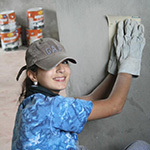
Daniela working for Habitat
“I saw how much impact some concrete could have on people. It was their house. It was their home. I was even more motivated because I saw that infrastructure was beyond the physical dimension. It could become something so dear to people. So I started looking for opportunities to do this in college. To continue with these same types of projects,” Daniela explained.
As she continued to explore her options for her future after high school, she learned of Notre Dame.
“I didn’t know much about it, but I started researching it, and fell in love with the university. It was everything I was looking for. From academics, to spirituality, to a sense of community and sports. It was my dream school,” Daniela described.
The economics of moving to a new country for school, plus having a father sick with multiple sclerosis, and a sister born when Daniela was a junior, made Notre Dame seem like an impossible dream. Her college counselor even told her not to apply, as there was no way she would get the financial assistance she needed.
She applied anyway. Then she began to wait.
The same week she received her acceptance from Notre Dame, she also received an acceptance letter from another university, ranked number one in the USA at that time. Everyone assumed Daniela was choosing the latter.
Then Daniela had the opportunity to attend the Hesburgh International Scholars Experience (HISE) at Notre Dame, a campus visit program that provides international students, mostly from Latin America, the opportunity to experience Notre Dame’s campus over five days. She attended classes, met with future professors, stayed in a residence hall, and experienced the Notre Dame family.
“The moment I visited ND, I felt completely at home, ” Daniela said. “Not only were the people super nice and welcoming, but it was also a very peaceful place. From all the meetings with faculty and information sessions, I got a strong sense of service related to academics, even in engineering, which is sometimes hard to find. I realized ND is one of those places where engineering is taught with a focus on human dignity and service.”
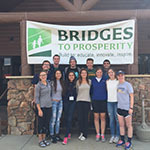
NDSeed in Colorado
Being on campus gave Daniela a renewed sense of belonging at Notre Dame. Through programs she learned about during HISE, such as NDSEED (Notre Dame Students Empowering Through Engineering Development) and Engineering2Empower, it became more obvious to Daniela that she would return to campus as a student.
“The other university I was accepted to might be perceived as the perfect university by many people. Notre Dame was the perfect university for me,” reflected Daniela.
She told her family her decision when she returned home. HISE had given her a greater awareness about the world outside of Ecuador and how much there is to be done. She knew it would be hard spending four years in a foreign country, missing out on her sisters growing up. Daniela knew she was doing it for a reason.
“I want them to enjoy a better future, a better Ecuador, a better world. I want to contribute my little grain of sand to that,” said Daniela.
So she boarded a plane and flew from Quito to South Bend, a week before classes started in 2014. Her HISE friends and the strong Latino community she had come to know made the transition smooth, and she never felt out of place at Notre Dame.
“I realized that although all of the students are from very different places, and very different contexts, students here have really strong values. It reaffirmed that I had made the right choice in coming to Notre Dame. People might be from a different country, but they have the same sense of caring and respect for everyone,” Daniela said.
As Daniela began her studies, she searched for ways to connect with that culture of service in engineering she had been exposed to at HISE. She reconnected with NDSEED, an undergraduate student chapter of the NGO Bridges to Prosperity, which builds pedestrian bridges in the developing world. Daniela learned that this was a unique group on campus—new members for the chapter are chosen through an application process conducted by current members. Her friends in engineering said it would be hard to get in, and very hard if she did get in.
She applied anyway. Daniela was accepted to be part of the summer traveling team and to be in the Engineering for International Development course during the Fall and Spring of her sophomore year.
Daniela and her colleagues began preparing for a summer 2016 trip to build a bridge in a Nicaragua. They started off in September 2015 by attending the Bridges to Prosperity Conference in Colorado.
Throughout the academic year, NDSEED members are expected to fundraise for travel and supplies. Daniela and her team all applied for grants from the Flatley Center for Undergraduate Scholarly Engagement (CUSE) and the College of Engineering, and they were awarded funds to attend the conference.
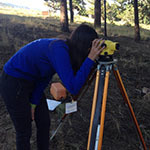
Daniela in Colorado
While Daniela attended many technical and hands-on workshops on bridge building in Colorado, she also chose to attend sessions that addressed the the social side of bridge building: Community Impact Assessment, the Empowerment Model, and alumni talks from prior student engineers. She was exposed to a network of professionals dedicated to international development through infrastructure, and she became even more committed to doing her best work on this team.
In order to take advantage of the experience that Nicaragua would provide, Daniela and some of the NDSEED members chose to enroll in the International Summer Service Learning Program (ISSLP), which includes the Global Issues Seminar through the Center for Social Concerns.
“During that class, we had to do a lot of readings about basic human rights, preferential option for the poor, social justice all these other aspects of service that we didn't have exposure to through our engineering classes. One of the topics that caught my mind a lot was Catholic Social Teaching, because I realized that the minor ties together the different dimensions of my life goals—the spiritual part, as well as the human and professional parts. I added it as a minor. It helps me find a greater meaning behind my major,” Daniela explained.
As coursework and planning continued, the NDSEED members began a letter-writing campaign to help raise additional funds to send the team to Nicaragua that summer. Each student sent letters to their friends and family asking them to support the team in their fundraising efforts. Daniela watched as her classmates mailed out letters and received donations.
“There’s a very strong culture of donating to projects like this in America, and that doesn’t happen in Ecuador. My letter-writing was unsuccessful, and I felt like I was being a burden on the team,” said Daniela.
Then Daniela remembered her experience with CUSE from the conference in September. She had attended the Center’s grant-writing workshops and met with its advisors in the process of applying for her Conference Attendance grant. She returned to her CUSE emails and the website to see if there was anything more she could do.
She learned about the CUSE Eagan Fellowship, which is an opportunity to earn $5,000 to fund a summer project. Projects have to be academically grounded, supported by faculty, and offer a springboard for future intellectual engagement. The award specifically targets underrepresented students on campus who can demonstrate financial need.
Daniela began working with her faculty mentor, Dr. Tracy Kijewski-Correa, on her grant proposal. Dr. Kijewski-Correa is heavily involved in NDSEED and was able to help Daniela focus her research question and outline her methodology.
She then met with Dr. Yvonne Mikuljan, Assistant Director of Undergraduate Research at CUSE, to work through her proposal writing. She took the time to learn the processes and procedures of grant writing through the CUSE office, and she continued to refine her proposal. Dr. Mikuljan warned her that the process would continue to be difficult and was very competitive.
She applied anyway.
“In Ecuador, at my school, I was always at the top. If I applied for something, I knew I had a decent chance of getting it. At Notre Dame, I found myself surrounded by extremely passionate and qualified people. I didn’t think I had a chance,” said Daniela.
She received word several weeks after applying that she had been selected as 2016’s only Eagan Fellow.
“I was at my job in the Bond computer lab, so it was completely silent. I ran toward the sophomore Architecture studio in the middle of their class time and told my friend, who had helped me with my proposal. As soon as my shift was over, I called my parents. They were ecstatic. I went down to the grotto and lit a candle in thanksgiving, not only for the Eagan, but because I knew that in spite of what everyone may have thought, I made the right decision by attending Notre Dame,” said Daniela.
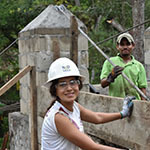
Daniela in Nicaragua
Daniela had spent two semesters going to classes, attending weekly planning meetings, and participating in construction workshops on cold winter weekends. It was finally time for the team to head to Nicaragua. They would be helping build a bridge across a river in Terrero Sur, a rural community in northern Nicaragua.
Each member of the team had a specific role on site. Daniela was the construction manager. With help from other team members, she had to take all that she learned about the stages of the construction process and develop a schedule and implement it on site. This involved coordinating materials, tools, time, and people.
She was also one of the two native Spanish speakers in her team. Because of this, she was in charge of communicating between the ND team members, the community members, and the Bridges2Prosperity foreman.
“It was very delicate. I had to make sure not to offend any party, and still get things done with the highest standards possible,” said Daniela.
Due to different circumstances, there were several times where she was the only Spanish speaker on site. Because of her communication skills, Daniela also took over logistics, like getting food and laundry for the team. She coordinated local deliveries and spoke with the municipality representatives regarding the project.
Her team from ND had a hard time adjusting to local conditions in Nicaragua. Many of them got sick, and that left Daniela coordinating hospital visits and operating a construction site that had fewer workers than scheduled.
“As a team, we became very strong,” Daniela said. “We had to find a way to take care of each other as a family, take over the responsibilities of whomever was sick or overwhelmed.”
Daniela and her team worked steadily over the course of two months. The 52-meter bridge they were constructing traversed a river that kept the main community cut off from the road, agricultural fields, and neighboring towns during floods.
“It even happened while we were there. One night, it wouldn’t stop raining, and the next day we couldn’t cross to the other side to work because the river was so high. And that was just one night of raining, and it wasn’t even the worst part of the winter. So we experienced first-hand what the need in the community was,” Daniela said.
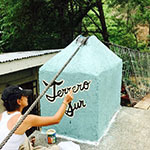
Finishing the bridge
Working side-by-side with the community, they completed the bridge to specification and changed the lives of many people in Terrero Sur.
“This project helped me realize how capable we are of actually creating something that will improve other people’s lives. It made all the past and future sleepless nights of studying for engineering tests worth it. It took a year of preparation and 8 weeks to actually build the bridge. However, during those 8 weeks we were also able to help a community believe in themselves. In Nicaragua I experienced firsthand how much there still is to be done in terms of international development and was reassured on the fact that people don’t just need our aid; they need us to be tools to show them how to make the best use of their potential,” Daniela said.
Daniela’s next adventure has landed her in Australia for a Fall 2016 study abroad semester through Notre Dame International. She continues to work on her civil engineering courses, and she is enrolled in a graduate level course titled “Conservation of Cultural Landscapes, Historic Towns, and Urban Precincts” to begin to learn more about placing civil engineering in a cultural context.
Moving forward, Daniela hopes to continue her involvement with NDSEED, helping the next team throughout this year and being involved as an alumna. She wants to continue working with Dr. Kijewski-Correa, who has plans this upcoming year to conduct research in Daniela’s home country of Ecuador.
Since the earthquake in Ecuador in April 2016, Daniela is even more committed to using her talents to help rebuild her own country.
“The best way I can help right now is by gaining as much experience from countries that have better technology and platforms to handle different issues related to infrastructure,” Daniela explained.
She hopes she can attend graduate school in the future, where she would like to study something in the fields of international development, anti-seismic structures, disaster relief and resilience, and/or urban planning and conservation. When asked what she’d share with people considering following a similar path, Daniela said, “I would tell them that my summer in Nicaragua was one of the hardest but most rewarding experiences in my life. It’s not the kind of thing you can do without an open mind and heart. You might have a passion for infrastructure or service from the beginning, but the only way to maintain it is by interacting with the people around you. Share with your teammates, share with the community. It may sound clichéd, but there is actually a lot more that you will learn from them than the other way around.”
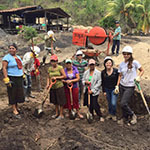
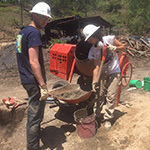
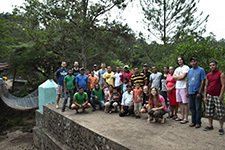
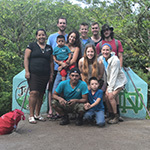
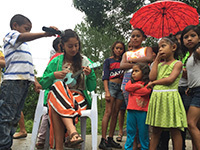
The Flatley Center for Undergraduate Scholarly Engagement (CUSE) at the University of Notre Dame would like to thank Phil Eagan, whose generous gift made Daniela’s research possible. CUSE promotes the intellectual development of Notre Dame undergraduates through scholarly engagement, research, creative endeavors, and the pursuit of fellowships. If you would like to support undergraduate research at ND, if you're a current ND undergraduate interested in learning more about research, or if you'd like to learn how you can help students like Daniela, visit http://cuse.nd.edu.